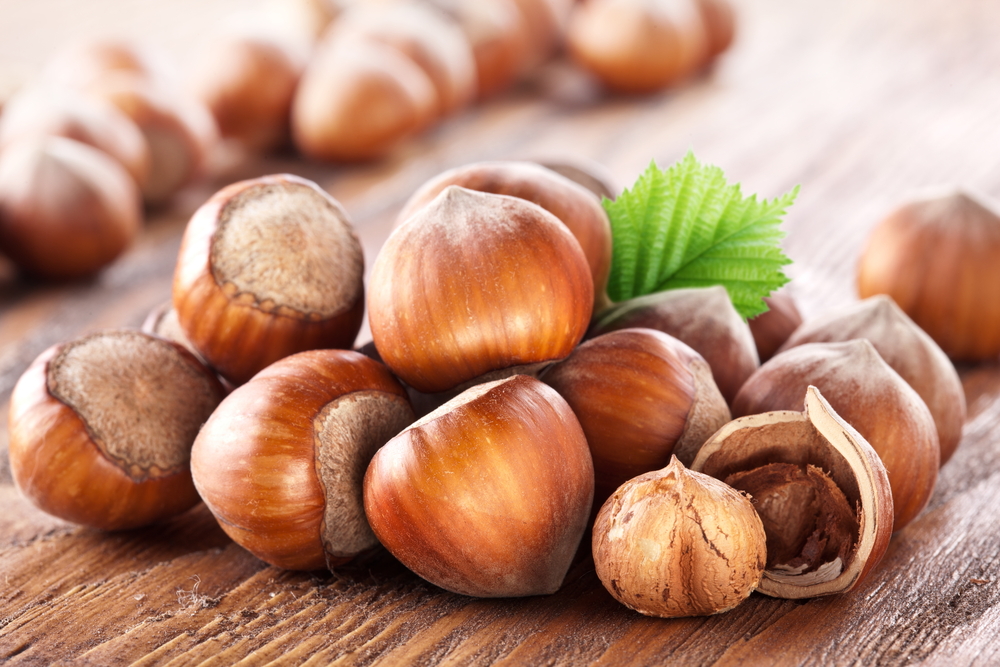15 Proven Health Benefits of Hazelnuts

Proven Health Benefits of Hazelnuts that you need know. Moreover, the Hazelnuts contains properties beneficial for prevent and fight various diseases. Hazelnuts, also known as filberts, are slightly sweet and tasty nuts belonging to the Betulaceae family. Hazel is a deciduous tree native to Europe and Turkey. It is cultivated all across the world, but is grown extensively in Turkey, Italy and the US.
The hazel fruits are borne in clusters and are held in a short, leafy capsule. The nut is yellowish to brown in color and is spherical to oval in shape. This marble sized nut is packed with a wide range of benefits. Apart from being a tasty indulgence, hazelnuts can help reduce weight and maintain the health of the heart.
It is a rich source of minerals like calcium, folate, zinc, potassium, iron and manganese. A hundred gram serving of this tasty nut provide 328 calories. According to a research, hazelnuts contain 20 times more antioxidants than Vitamin C and 50 times more than Vitamin E! Then, check the benefits of Hazelnuts for health:
Vitamin E: 100 grams serving of hazelnuts provide 15% of the daily-recommended value of vitamin E. Hazelnut oil is a well-known source of vitamin E. Vitamin E prevents the disintegration of the red blood cells, reducing the risk of anemia. A proper circulation of blood also strengthens the immune system, keeping fever, cold, and other illnesses at bay.
Hazelnuts Cancer: Hazelnut is believed to eliminate the factors that lead to the development of cancerous cells. It defuses the malicious cells present in the body, preventing the possibility of cancer. Beta-sitosterol, a compound found in hazelnuts, reduces the risk of breast and prostate cancer. Several studies have concluded that hazelnuts contain alpha-tocopherol, a type of vitamin E that reduces the risk of bladder cancer by half.
Heart health: Hazelnuts are rich in unsaturated fats that are extremely beneficial for the heart. The oleic acid in hazelnut lowers the bad cholesterol and raises good cholesterol in the blood. Regular consumption of hazelnut decreases cholesterol by 27%. Studies have also revealed that eating hazelnuts reduce the oxidation of bad cholesterol that stick to the artery walls, obstructing the blood vessels.
Hazelnuts Muscles: Magnesium plays a very important role in regulating the amount of calcium that goes in and out of the body. The proper amount of calcium promotes muscle contraction and allows the muscles to relax when they are not needed. This prevents muscle tension, soreness, spasm, fatigue, and cramps. The high levels of magnesium also help increase muscle strength.
Bone and Joint Health: Hazelnuts are also rich in manganese, a mineral required for the growth and strength of bones. Magnesium in hazelnuts can be very useful for building the structure and strength of the skeletal system. It increases bone mineral density and fights osteoporosis.
Nervous System: Hazelnuts are rich in Vitamin B6, which is required for the creation of myelin, the sheath of the nerve that increases the speed and efficiency of electrical impulses, enabling the nervous system to operate properly. Hazel nuts are also instrumental in the synthesis of neurotransmitters like melatonin, serotonin, and epinephrine.
Digestive Tract Health: Manganese in hazelnut acts as a catalyst in the synthesis of fatty acids and cholesterol. It also facilitates the protein and carbohydrate metabolism. The high fiber content in hazelnuts promotes regular movement of food and waste in the digestive tract. It balances the chemicals and microorganism necessary for a healthy digestive system. Eating high amounts of fiber assists in managing weight by keeping you satiated longer.
Skin Health: Vitamin E protects the skin from the harmful effects of ultraviolet rays, reducing the risk of skin cancer and dark spots. Vitamin E is also required for maintaining the integrity of the cell membranes, preventing premature ageing. It also protects the skin from harmful free radical attack. Regular facial massage with hazelnut oil protects the skin from dryness too.
Good for Colored Hair: Hazelnuts are used as a natural ingredient in various coloring agents. Along with rendering a delectably delightful brown hue to the strands, hazelnut also makes sure that the color lasts longer. Plus, it offers an extra protection by keeping the colored tresses conditioned and thus, safeguarding it from the damages triggered by chemical application.
Strengthens Hair: You can use the oil extracted from these nuts in your daily hair care regimen. Just apply a little on the scalp and hair and massage for a few minutes. Leave it overnight and wash off the next day, if desired. You can use a mild shampoo. This will help in strengthening the hair from the roots.
Good For Dry And Damaged Hair: Is your hair too dry? Hazelnut could come to your help. Add 2 tablespoon finely powdered hazelnuts to 2 eggs and beat well. Apply this mixture on your dry scalp and hair. Wash off after 20 minutes with lukewarm water and a good shampoo. This will keep the dry hair conditioned and tamed.
Say Bye To Split Ends: Give your split ends a dose of good health by massaging a few drops of hazelnut oil. The damages will disappear over the time, leaving the hair healthy and radiant.
A Good Snack For Dieters: Chuck out those high calorie munches now and grab a handful of hazelnuts to give your weight loss journey a tasty twist. Just 1 oz of hazelnuts will give you 176 calories with 3 grams of dietary fiber and 17 grams fat. You can use it as a pre-meal munch as it fills up your stomach and prevents you from overeating your meals. Just make sure you do not go beyond the recommended level.
Good For Heart: These brown kernels are good sources of unsaturated fats and lacks cholesterol. Unsaturated fats, especially oleic acid, has the potential to curb the levels of LDL while promoting the levels of HDL. Just one cup of these nuts meet 50% of the required magnesium levels.
Magnesium plays a major role in regulating the level of calcium. An exaggerated level of calcium is known to be harmful for heart health. Magnesium safeguards your heart by creating space for its ‘rest’ and preventing its overstraining.
